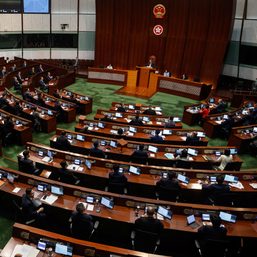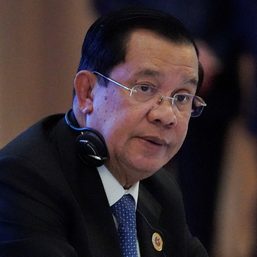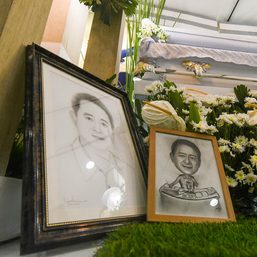SUMMARY
This is AI generated summarization, which may have errors. For context, always refer to the full article.
![[Newspoint] Under Duterte’s shadow](https://www.rappler.com/tachyon/2023/07/Newspoint-Under-Dutertes-shadow-July-14-2023.jpg)
We thought the recusal of Judge Romeo Buenaventura made for the elimination of the final roadblock to justice and freedom for Leila de Lima. But we’re now made to think again, and realize that her chief persecutor, ex-president Rodrigo Duterte himself, has cast a much longer shadow than we hoped he did and could.
In all of De Lima’s six and a half years in jail, things had not begun to look up for her as much as when she was acquitted in two of the three drug-trafficking cases concocted against her. All three cases had been brought to court in the first year of Duterte’s election, in 2016, and both acquittals came after his term.
But things looked grim again when Buenaventura, the trial judge in the third and last case, denied her bail. Then, hopes went up again when, upon being revealed for close links to the people who had mounted the congressional inquiry that had set off De Lima’s persecution, he was replaced, and replaced by the judge who last acquitted her – Abraham Alcantara.
But that lift was even more fleeting. Before Alcantara could begin to try the case, he, too, recused himself, and not for anything even vaguely comparable with the issue raised by the defense against Buenaventura. The state prosecutors wanted Alcantara out of the way for the most puerile and insulting of arguments: because he once acquitted De Lima, he could not be expected to be fair.
In her “Dispatch from Crame No. 1304” – one of those memos she writes by hand because her jailers would not even provide her with a decent implement for the purpose – De Lima says:
“While I respect the decision of Judge Abraham Joseph B. Alcantara recusing himself…, I am truly disappointed at the prosecution’s move in seeking for such inhibition.”
Sorry, but I can’t seem to summon up a more magnanimous feeling for that judge than pity. He was quick to surrender presumably out of dread for himself, a sense common to anyone who comes under the long shadow of Rodrigo Duterte – it was Duterte who appointed both Buenaventura and Alcantara judge.
To be fair to Alcantara, acquitting De Lima was in itself a bold decision to make under the circumstances. Still, giving in to a patently unmeritorious motion, one presented yet with a palpable sense of impunity, bore portents not only for De Lima, but for anyone seeking genuine justice. Such precepts for it as the presumption of innocence for the accused and the expansion, on the one hand, of rights and freedoms for citizens and, on the other hand, the moderation of power, especially official power, given its unequalled resources for intimidation and repression, are all turned on their heads.
De Lima herself alluded to it in her dispatch: “If they are truly agents of justice, [those state lawyers] should have proceeded to entrust the appreciation of their evidence through the crucible of a judge whose independence, impartiality, and courage to do the right thing have already been proven in the past, i.e., in my second case.
“Judge Alcantara’s rendition of judgment of my and my co-accused’s acquittal…case was definitely above board, consistent with law, evidence, and reason. The prosecution’s ground for inhibition in this last case is nothing even remotely close to the [that] raised in the case of Judge Romeo S. Buenaventura. Judge Alcantara does not suffer from any similar cause for inhibition such as a close blood relationship to a lawyer who played a part in my persecution, a clear case of conflict of interest.
“Inhibition is done to assure the accused, not the government, that the trial of the case will be fair and regular. The Constitution’s Bill of Rights upon which all of the most basic elements of our justice system are grounded has for its inception the fundamental law’s assurances against the abuse of the strong arm of the law by the State.
“The Constitution always presumes that it is the government [that] is capable of abuse and [of] removing lady justice’s (i.e., a judge’s) blindfold to rig the justice system. This is not merely a legal presumption. It is a constitutional presumption. It is the entire basis and rationale for Article III of the 1987 Constitution. Hence, the Bill of Rights OF CITIZENS [the capitalization is hers]. Otherwise, the Constitution might as well have added another…, this time to contain a Government’s Bill of Rights against its citizens, or against another branch of itself. But that would have been absurd, as absurd as the Prosecution’s motion for inhibition.”
Come to think of it, Operation Leila de Lima has been absurd all along – from the concoction of the cases against her to the enlistment of false witnesses – life convicts mostly – to the dragging out of her trial to Kingdom Come, plainly because the absurdity could not be made to look anything other or less than that. – Rappler.com
Add a comment
How does this make you feel?









![[Just Saying] SONA, Congress, accountability, and free speech](https://www.rappler.com/tachyon/2024/07/TL-SONA-congress-accountability-free-speech.jpg?resize=257%2C257&crop=330px%2C0px%2C1080px%2C1080px)
![[Just Saying] Reciting a hymn and pledge: Illegal, punitive, unconstitutional](https://www.rappler.com/tachyon/2024/06/20240612-reciting-hymn-pledge-unconstitutional.jpg?resize=257%2C257&crop=338px%2C0px%2C720px%2C720px)
![[Just Saying] Demonizing divorce and the mockery of our Constitution](https://www.rappler.com/tachyon/2024/06/TL-Demonizing-divorce-mocking-constitution-June-6-2024.jpg?resize=257%2C257&crop=265px%2C0px%2C720px%2C720px)
![[ANALYSIS] A Rube Goldberg cartoon of our inconvenient reality](https://www.rappler.com/tachyon/2024/05/tl-inconvenient-reality-05092024.jpg?resize=257%2C257&crop=280px%2C0px%2C720px%2C720px)
![[Vantage Point] Philippine economic reforms run into headwinds](https://www.rappler.com/tachyon/2024/05/ph-economic-headwind-may-2024.jpg?resize=257%2C257&crop_strategy=attention)




![[Just Saying] A reawakened Supreme Court?](https://www.rappler.com/tachyon/2024/05/reawakened-supreme-court-may-21-2024.jpg?resize=257%2C257&crop=384px%2C0px%2C1080px%2C1080px)
![[OPINION] Rodrigo Duterte and his ‘unconditional love’ for China](https://www.rappler.com/tachyon/2024/04/rodrigo-duterte-xi-jinping-august-2019.jpeg?resize=257%2C257&crop=91px%2C0px%2C900px%2C900px)



![[The Slingshot] Lito Patay’s 4 hours and 38 minutes of infamy](https://www.rappler.com/tachyon/2024/07/Lito-Patay-4-hours-infamy-July-19-2024.jpg?resize=257%2C257&crop=233px%2C0px%2C720px%2C720px)
There are no comments yet. Add your comment to start the conversation.